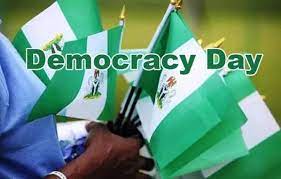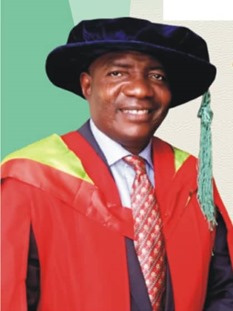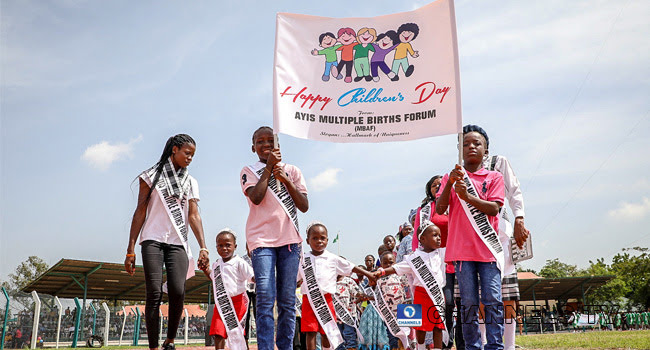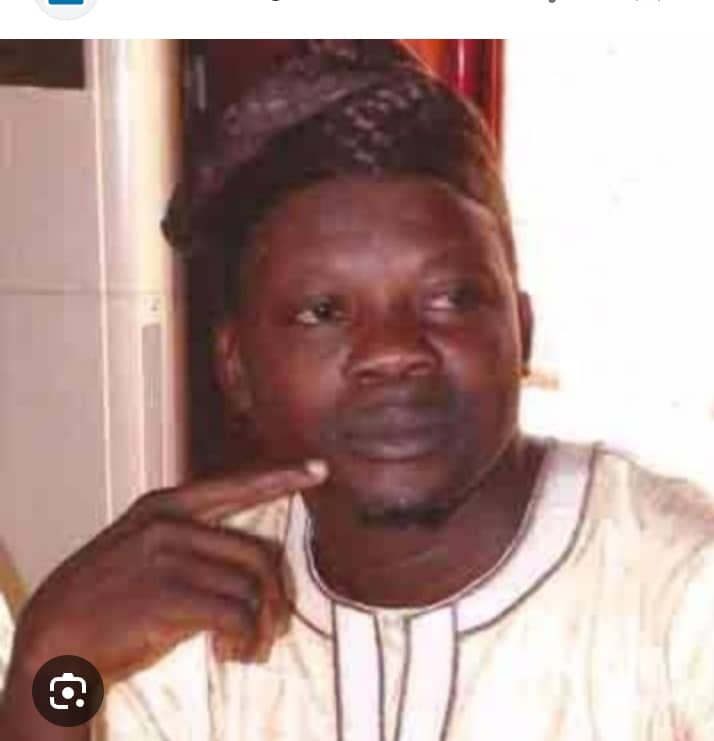PAG Felicitates Muslims on Commencement of Ramadan Fast
February 18, 2026TOP TEN MUSLIM UNIVERSITIES IN AFRICA
February 14, 2026ANALYSIS: Why Nigeria GDP is not the best in Africa Despite having the largest market
February 10, 2026DEMOCRACY: Many Untold Historic Struggles Birthed Achievement
DEMOCRACY: Many Untold Historic Struggles Birthed Achievement

By Sanusi Abdullahi Oyelekan.
As the fifth anniversary of the celebration of June 12 as Nigeria’s Democracy Day comes up today with one of those involved in the struggles, Asiwaju Bola Tinubu, in charge as President, Sanusi Abdullahi Oyelekan writes to remind Nigerians about the struggles.
Recall that in 2018 before the expiration of his first term, former President Muhammadu Buhari dealt a political master stroke on the tragedy and long clamour that trailed the annulment of the June 1993 presidential election won by late business mogul, Basorun Moshood Kasimawo Abiola, when he declared June 12 as the country’s Democracy Day as against May 29th.
The historic decision was a final closure to a democratic struggle that lasted for 25 years. It was a victory for democracy and pride for pro-democracy activists, especially for the late Moshood Abiola’s family who remained terrified all those years, not only by the death of their beloved parent but also by the disregard and injustice suffered in the hands of those who profited from the tragedy.
The decision was to posthumously honour MKO Abiola, the presumed winner of the June 12, 1993 presidential election after available election data showed that he won the polls but was never formally declared winner and was not sworn into office by the military government of General Ibrahim Babangida.
Three decades after the election, former Nigeria’s military President Ibrahim Babangida said he annulled the June 12, 1993, presidential poll to prevent a coup in the country.
Babangida, in an interview on Arise TV, said that some top officials in the military would have staged a violent coup if he did not annul the election.
His words: “If it materialised, there would’ve been a coup d’état which could have been violent. That’s all I can confirm. It didn’t happen thanks to the engineering and the ‘Maradonic’ way we handled you guys in the society with a tinge of disdain. But that could’ve given room for more instability in the country.”
Sadly, Abiola was later imprisoned by the Sani Abacha’s military regime while he battled effortlessly to claim his mandate.
In 1998, he died in prison. Successive governments since 1999 ignored calls by Nigerians and other pro-democracy activists to honoured Abiola and for the federal government to recognise June 12 as democracy day.
But the agitation put to rest in 2018 by the Buhari’s administration and Abiola was declared winner of the election and was conferred with the nation’s highest honour, the Grand Commander of the Federal Republic (GCFR) an honour that is exclusively conferred only on presidents and former presidents.
Abiola’s former running mate, Ambassador Babagana Kingibe, was also bestowed with the GCON award.
In his last Democracy Day speech before the end of his first term in office, President Buhari described the annulment of the June 12, 1993 presidential election as “the worst of our leadership”.
He said, Nigerians must never forget the sacrifices of the heroes of Nigeria’s democracy during 1993 poll.
“Their patriotism and peaceful struggle”, he said “should guide our actions especially when it comes to electing our leaders and holding them accountable, now and in future”.
Buhari’s political masterstroke may have mollified the injured and the multitudes of others who were equally bruised in the campaign for June 12, but some political elites and victims of the tragedy expected more from his administration.
Today, as the country celebrates its Democracy day, for many Nigerians who witnessed the dark days of the Sanni Abacha’s era, June 12 remains consolation for the annulment of an election that was adjudged the most transparent ever conducted in the history of the country.
June 12 represents an important milestone in the annals of Nigeria’s democratic journey. It was the day Nigerians shunned ethnicity and religion to vote for that leader of their choice in an election adjudged clearly free and fair.
For President Bola Tinubu, who was one of the victims of Abacha’s dark era, it is a fulfillment of the sacrifices made by the patriots who gave up themselves in service of the noble fight for democracy, freedom and rights as well as the duties that democracy bestows on all.
Tinubu was a member of NADECO who fought alongside MKO Abiola and was with the group in exile, championing and funding the cause of pro-democracy and the battle to reclaim Abiola’s mandate. The struggle lasted four years until Abacha and Abiola died in 1998.
Tinubu today, remains the only pro-Democracy fighter elected as a governor and now a president of Nigeria.
His history cannot be erased as a frontline fighter for democracy between 1993 to 1999.
While in exile, he, Wole Soyinka among others, were together planning how to battle the Abacha government. One of the things they succeeded doing then was to raise funds for revolution against the Abacha government.
During Bola Ahmed Tinubu’s 5th Colloquium, Soyinka went down memory lane on their relationship and friendship of over two decades.
Even after the death of Abiola, Tinubu’s fight for democracy and the drive to recognize the heroes of that struggle would continue for 19 years until the Federal Government moved Democracy Day to June 12 and the winner of the June 12, 1993, presidential election formally awarded the highest honour in the land.
At the beginning of the Fourth republic when Tinubu was elected governor of Lagos State, he ensured that Lagos took the front page in Nigeria for the next eight years. He found himself in another battle for true federalism and good governance against former president Olusegun Obasanjo, who had no democratic experience and was still raw as a military dictator.
The battle was fought on many fronts – independent power generation, creation of local development areas, Onshore/Offshore Dichotomy, funding for the dilapidated federal infrastructure in Lagos State. Obasanjo and PDP ensured Lagos was punished for it by withholding the much-needed federal allocations. But against all odds and federal might, Tinubu won all the battles.
Only recently, the National Democratic Coalition (NADECO) a group Tinubu jointly formed with other pro-democracy activists after the June 12, 1993 poll annulment, wrote him seeking Nigeria’s return to the republican constitution.
In the letter signed by its spokesperson, Ayo Opadokun, the pro-democracy group noted that the 1963 republican constitution ensures true federalism and guarantees peaceful co-existence among regions and tiers of government in the country.
Opadokun in the letter said NADECO is gratified that one of its most prominent leaders, who, in fact, contributed significantly to the titanic democratic struggle and campaign that the organisation had to embark upon on behalf of Nigerians to restore democracy to Nigeria, has, by divine destiny, become the elected President of the country of our birth.
He said: “We like to remind you of the most important demand of our common and just struggle, which was centred on the imperative necessity to return Nigeria to federal constitutional governance upon which we secured our independence.
“Nigeria remains a country, not a nation to date, because the military had without Nigerians democratic approval truncated, illegally suspended, abrogated and replaced our negotiated independent constitution and replaced it with unitary constitution to date.
“The deceptively choreographed, 1979 and 1999 constitutions which preserved all the grave damages which successive military governments have forcefully imposed upon Nigeria remain the bane of Nigeria’s backwardness, stunted growth and unacceptable level of poverty.
“NADECO is more than convinced that a return to the independence/republican constitution will restore responsive and responsible government in the minimum as we grapple with the business of reconstructing our country.’’
Buhari’s June 12 political masterstroke which has clearly mollified the injured and the multitude of others, who were equally bruised in the campaign for actualization of June 12, seems not to be enough to many Nigerians who believe that democracy should be what it’s called.
They believe that, though the government may never get at the truth or the justification for the annulment and those who stood on June 12, or stood against it or for it, but given the circumstances in the country today, there is the need to go beyond the symbolic gesture of anointing June 12 as Democracy Day and national public holiday to consolidate the gains of this momentous occasion.
Also, Former Governor of Ondo State, Late Rotimi Akeredolu, once called on President Tinubu to follow the path of honour and birth a new constitutional order that will make Nigeria a true federalism.
Late Akeredolu made the call in a statement where he advised the president to immediately settle down to work and not allow him to be distracted by frivolities.
The call for true federalism remains one of the boiling topic on the lips of most Nigerians.
“We all lined up to call ourselves Nigerians without gathering to discuss what it means. We cannot become a better Nigeria with an undue concentration of power at the Federal level”, Tinubu had said.
“The imbalance between the roles of the federal and state governments lies at the root of our difficulties. We need to re-balance the duties of the federal and state governments. The quest to correct the imbalance is the essence of federalism that I have advocated for so many years,” Tinubu was quoted have said this in his 2024 Democracy Day Broadcast this morning (Wednesday 12th, June, 2024).
Tinubu’s fight for democracy and promise of true federalism has left a moral burden on the president that Nigerians who voted him are confident he will not fail them.
True Federalism will speed growth and development. It will end ethnic tension and crush the widespread agitation for self-determination.
Like Tinubu did as Lagos governor to accelerate growth in the state, it’s expected that he will allow each state to be at liberty to grow at its pace, to give space for all federating units to breathe the air of freedom with more resources and greater control at their disposal to attract foreign investors and domestic growth of the economy.
Tinubu had before now promised to allow true federalism replace Unitarianism. He must be a man of his words to win the people’s trust that he is for them and is ready to put the country first above any other interest.
As President Tinubu addressed Nigerians today (Wednesday), people’s expectations were nothing less but a speech laced with variety of renewed hopes that would reflect the much awaited true federalism as Democratic system of government clocks 25th years of uninterruption.
END.











